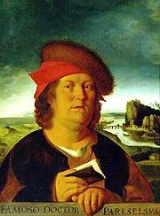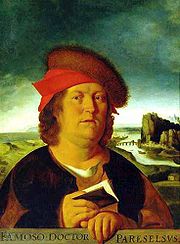
Paracelsianism
Encyclopedia

Paracelsus
Paracelsus was a German-Swiss Renaissance physician, botanist, alchemist, astrologer, and general occultist....
. It was prominent in late-16th and 17th century Europe
Europe
Europe is, by convention, one of the world's seven continents. Comprising the westernmost peninsula of Eurasia, Europe is generally 'divided' from Asia to its east by the watershed divides of the Ural and Caucasus Mountains, the Ural River, the Caspian and Black Seas, and the waterways connecting...
and represented one of the most comprehensive alternatives to the traditional system of therapeutics derived from Galen
Galen
Aelius Galenus or Claudius Galenus , better known as Galen of Pergamon , was a prominent Roman physician, surgeon and philosopher...
ic physiology
Physiology
Physiology is the science of the function of living systems. This includes how organisms, organ systems, organs, cells, and bio-molecules carry out the chemical or physical functions that exist in a living system. The highest honor awarded in physiology is the Nobel Prize in Physiology or...
. Based around the principle of maintaining harmony between the microcosm
Macrocosm and microcosm
Macrocosm and microcosm is an ancient Greek Neo-Platonic schema of seeing the same patterns reproduced in all levels of the cosmos, from the largest scale all the way down to the smallest scale...
, Man; and macrocosm
Macrocosm and microcosm
Macrocosm and microcosm is an ancient Greek Neo-Platonic schema of seeing the same patterns reproduced in all levels of the cosmos, from the largest scale all the way down to the smallest scale...
, Nature; Paracelsianism fell rapidly into decline in the later 17th century, but left its mark on medical practices; it was responsible for the widespread introduction of mineral therapies and several other formerly esoteric techniques.
Sources
- Allen George DebusAllen G. DebusAllen George Debus was an American historian of science, known primarily for his work on the history of chemistry and alchemy. In 1991 he was honored at the University of Chicago with an academic conference held in his name. Paul H...
. The English Paracelsians. University Of Chicago Press, 1968. (original publication 1965) - Allen George DebusAllen G. DebusAllen George Debus was an American historian of science, known primarily for his work on the history of chemistry and alchemy. In 1991 he was honored at the University of Chicago with an academic conference held in his name. Paul H...
. The French Paracelsians. Cambridge University Press, 2002. (original publication 1991) - Didier Kahn, Alchimie et paracelsisme en France à la fin de la Renaissance (1567-1625) [Cahiers d’Humanisme et Renaissance 80]. Geneva: Droz, 2007.
- Wilhelm Kühlmann and Joachim Telle, eds. Corpus Paracelsisticum: Dokumente frühneuzeitlicher Naturphilosophie in Deutschland. Tübingen: Max Niemeyer, 2001-.
- Jole Shackelford. A Philosophical Path for Paracelsian Medicine: The Ideas, Intellectual Context, and Influence of Petrus Severinus (1540/2-1602). Copenhagen: Museum Tusculanum Press, 2004.

